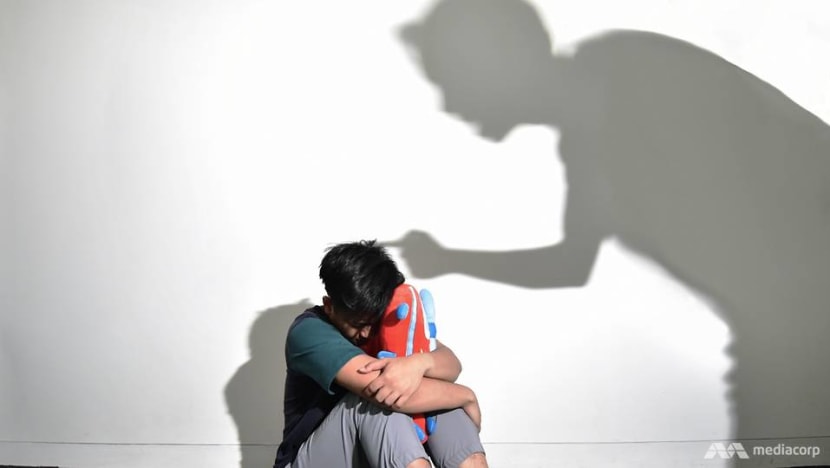Commentary: We sympathise with victims of trauma, but does it excuse their poor behaviour?
Incidents like Will Smith slapping Chris Rock raise the question of how culpable people who experienced childhood trauma are when they act out, says psychiatrist Lim Boon Leng.

SINGAPORE: By now, footage of actor Will Smith slapping Chris Rock at the Oscars has been viewed by millions. Whether we agree if any joke could justify a violent reaction or not, many criticised him for the assault.
Does knowing that Will Smith suffered the childhood trauma of helplessly seeing his mother get beaten by his father change how we view this bust-up? Perhaps we feel more empathy for him and better understand his urge to stand up for his wife – especially since her baldness, the butt of the joke, is due to a medical condition.
Trauma, and how it factors into the choices we make, has been a talking point for many recently. At home, a woman claimed she suffered a miscarriage after a four-hour wait at KK Women’s and Children’s Hospital (KKH). Investigations by KKH showed the allegations to be false.
In screenshots published by Wake Up Singapore, the alternative news source that carried her allegations, the woman said she acted “in the heat of the moment” as she was agonising over a previous miscarriage.
Sympathetic onlookers could say that the underlying psychological trauma, which the perpetrators had been subjected to, may have contributed to them acting out. Anyone can imagine how great the grief caused by miscarriage is and how it might lead to misdirected anger.
The wrongfulness of these acts was never in doubt. However, questions over culpability arose and were fiercely debated on social media. Exactly how much are the perpetrators to blame if they themselves are victims of psychological trauma?
WHAT IS TRAUMA?
Trauma is a response to extremely stressful events in life. It can result in myriad emotional difficulties and lead to bad behaviour.

Post-traumatic stress disorder (PTSD) is the most often quoted, and likely most misunderstood, form of trauma. Many thinking that any kind of stress can cause PTSD. But no, a hairdryer treatment from your army encik or a bad breakup does not give you PTSD.
Considered a psychiatric disorder, PTSD develops following a major event that exposes an individual to actual or threatened injury, or sexual violence. Witnessing such threats and violence, or vicariously experiencing it through someone close or in professional roles like first responders, can also bring about PTSD.
Individuals suffering from PTSD can have symptoms like nightmares, flashbacks, and intrusive, upsetting memories. They may be irritable, aggressive or display destructive behaviour. Those affected may experience symptoms for weeks or even their entire lifetime.
The quintessential representation of patients with PTSD is war veterans who struggle to reintegrate into civilian life. Even years after their service, they continue to be haunted by their near-death experiences.
Other patients have gone through prolonged and repeated traumatic events, such as neglect, abuse and violence from childhood. Because such mistreatment is often perpetrated by the victim’s family member, the victim feels trapped and perceives little chance of escape.
Such patients whom I’ve seen often hold negative views of themselves. They have severe low self-esteem and feelings of guilt and shame in addition to PTSD symptoms. This prevents them from making good choices in their lives, and they often choose to be with equally flawed partners.
This results in the further likelihood of violence within the unstable relationship and further traumatisation. They are often quick to anger or feel slighted from overmagnifying negative situations.
CAN TRAUMA ABSOLVE RESPONSIBILITY?
It is easy to imagine that this group of patients are not particularly endearing. Their difficulties with interpersonal relationships, including with their mental healthcare providers, often make it hard for them to engage with treatment.
Many of my fellow mental health colleagues would have experienced verbally abuse or even assault by patients with trauma from a difficult past. In cases where there were verbal threats, vandalism of clinic furniture or physical assault, I have had no choice but to terminate the doctor-patient relationship.
I can empathise with these patients’ struggles. All of us may encounter some distress or traumatic experience over the course of our lives. These can likewise leave us with indelible biases but otherwise won’t amount to psychological disorders like PTSD.
How do mental health hotline workers manage burnout and the burden of caring for those who call? Listen to CNA's Heart of the Matter:
Many patients who were bullied in school may function relatively well but can become triggered and relive these early-life traumas when they encounter office bullying. Individuals suffering the recent loss of a loved one often project the anger of their grief on the attending healthcare workers and behave aggressively towards them.
So, it isn’t difficult to use the concept of trauma to explain why an individual would behave badly.
Can we see Will Smith slapping Chris Rock as an act of protecting the most important woman in his life, something he could not do as a small boy? Was he simply trying to gain control to avoid the overwhelming sense of helplessness or guilt again?
Unfortunately, many often mistake aggressiveness for assertiveness and choose to act in a harmful way. It is ironic that their very wish to be in control results in the situation spiralling out of their hands.

Empathising with their past traumas does not mean that we do not hold them responsible for their acts. Providing a psychological narrative for these choices in no way absolves them because we can be held to account for our actions regardless of our previous life experiences.
Explaining away violent or dishonest acts through psychology is in no way helpful for perpetrators caught in the vicious cycle of their maladaptive behaviour and self-loathing.
For instance, I’ve seen a wife of an abusive alcoholic who rationalised his behaviour as the result of him getting beaten up by his father as a child. She condoned and tolerated his abusive behaviour, leading to an escalation of violence extending to their children.
In another case, a father reasoned that he only shouts at his children and so, isn’t physically abusive like his father. He hated himself for his verbal abuse but felt he could not change as he had been programmed that way from young.
It is unfair for the victim whose only means of reprisal may be to victimise others. It is dangerous when these acts are captured online and not dealt with, since it normalises victims of trauma getting away with harmful actions.
Taking perpetrators to task gives them the chance to express remorse, make restitution like apologising to the wronged party, and do better next time.
These incidents can be turning points for perpetrators to seek treatment and rehabilitation, ultimately helping them heal.
Dr Lim Boon Leng is a psychiatrist at the Gleneagles Medical Centre.

















